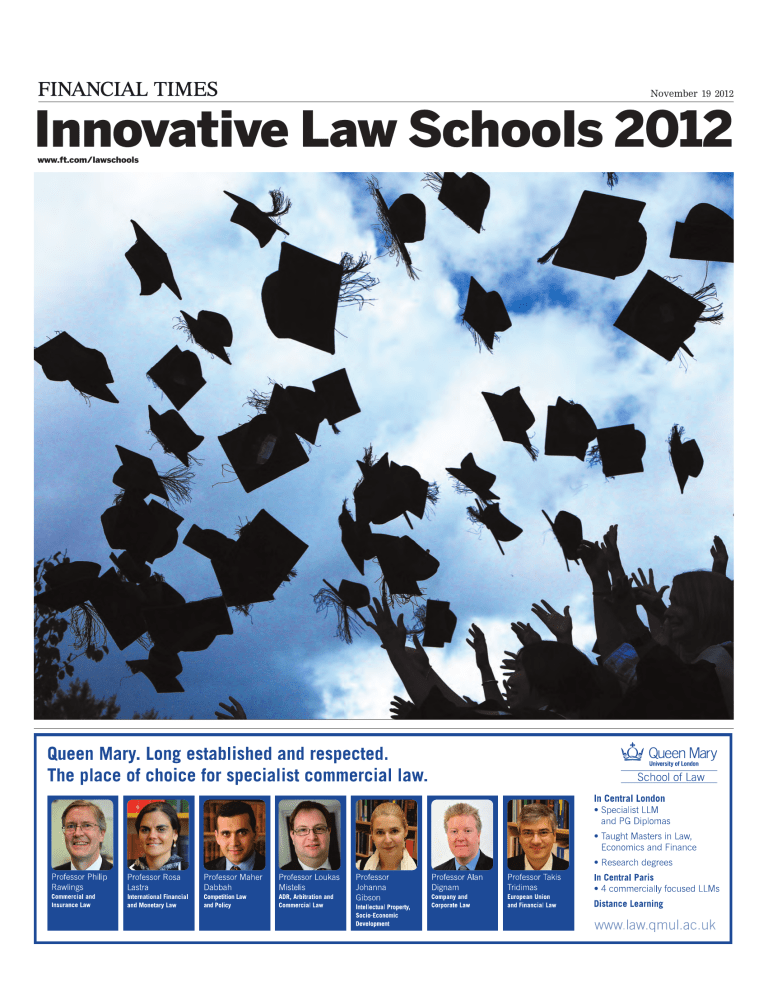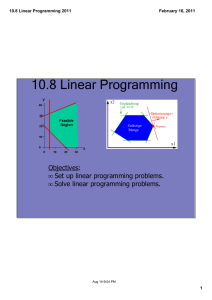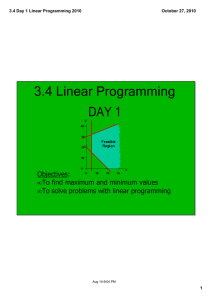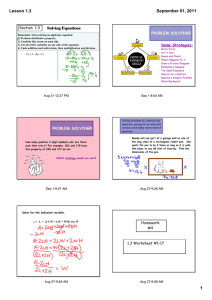Innovative Law Schools 2012 November 19 2012 www.ft.com/lawschools
advertisement

November 19 2012 Innovative Law Schools 2012 www.ft.com/lawschools FINANCIAL TIMES MONDAY NOVEMBER 19 2012 2 FINANCIAL TIMES MONDAY NOVEMBER 19 2012 INNOVATIVE LAW SCHOOLS | INTRODUCTION CONTENTS INNOVATIVE LAW SCHOOLS | INTRODUCTION Breaking down the Commercial law has traditionally been about setting up companies 2 4 5 6 7 8 INTRODUCTION Lawyers borrow from the managers’ toolkit to look more at risk and the bigger picture MASTER OF LAWS LISTING This year’s ranking shows how 86 of the top Master of Laws providers have performed ANALYSIS How the 2012 ranking compares with last year INTERNATIONAL LAW Students understand the importance of applying an international legal context PROFILE Duke University School of Law Q&A Master of Laws student Sonia Tan explains why it is critical to have a global perspective Special reports editor Michael Skapinker Editor Hugo Greenhalgh Production editor George Kyriakos Picture editors Michael Crabtree, John Wellings Art director Derek Westwood Online To get a more comprehensive list of all the Master of Laws providers in North America, Europe, AsiaPacific and Africa, as well as further analysis of the courses offered by the law schools, visit: www.ft.com/lawschools T HIS MONTH, 22 OF AUSTRIA’S high-flying judges and public prosecutors temporarily put aside their caps and gowns and went back to school to uncover the best way to fight white-collar crime. They were part of a programme designed by the Austrian Federal Ministry of Justice with Vienna University of Economics and Business (WU), partly to give the judges and prosecutors a greater insight into corruption but also to speed up the trial process. “The ministry said they would like to fight corruption in Austria with education,” says Astrid KleinhannsRollé, managing director of the WU Executive Academy. The programme, which covers everything from financial risk and corporate reporting to compliance and insolvency, is just one example of how the previously distinct boundaries between the disciplines of law and business are blurring. Business schools and law schools alike now understand they have to deal with the convergence. The top law schools have been facing this issue for years, says Michael Fitts, dean of the University of Pennsylvania Law School, which runs joint certificate and degree courses with its boundaries of business and law rather than making business decisions, something that schools are looking to change, writes Della Bradshaw Fletcher School of Law and Diplomacy at Tufts University close to Boston. “No single professional school feels it has the breadth, the depth and the range of disciplines as well as the range of geographies,” he says. The move towards international relationships and the potential rebalancing of economic power between countries in the northern and southern hemispheres needs to be addressed, he says. “It’s about the challenges of dealing with different societies, with domestic and international legal systems.” The Fletcher school already teaches its flagship masters in law and diplomacy as a joint MALD/ MBA programme with four business schools: Ceibs in China, HEC Paris in France, IE in Spain and Dartmouth College’s Tuck School of Business in the US. He refers to students on these programmes as “360-degree people”. Prof Chakravorti says: “These are students who see themselves as leading an international life. They are deeply committed to using business and private sector principles but they definitely understand the importance of understanding legal principles.” Prof Fitts at Penn Law sees a similar scenario: “A good percentage [of the business and law graduates] will spend time practising abroad at some time.” Back to school: the library and learning centre of the Vienna University of Economics and Business, due for completion in 2013, has been designed by Zaha Hadid CONTRIBUTORS Della Bradshaw is the FT’s business education editor Charlotte Clarke is the FT’s business education online and social media producer Adam Palin is the FT’s business education researcher Michael Tansini is a freelance journalist Publisher, Emea Dominic Good Head of B2C Elli Papadaki Head of business education Sarah Montague Account managers Ade Fadare-Chard, Gemma Taylor Publishing systems manager Account executives Pierre Abouchahla Andrea Frias-Andrade Advertising production Daniel Lesar 3 neighbouring business school, Wharton. But the rate of change has accelerated. “It’s gone into hyper-speed now.” He lists three reasons. First, many of the law firms’ clients are corporations; second, that legal services firms need to be better managed; and third, the abilities of lawyers and managers are complementary. While lawyers scrutinise the detail and understand regulation, managers look at the bigger picture and at the risk, he says. In a similar way to the University of Pennsylvania, the School of Law and the Stern School of Business at New York University have been teaching joint programmes for many years, but in September they took a further step by appointing Karen Brenner to the new role of executive director of law and business, to act as a bridge between the two schools. Like Prof Fitts, she believes that the globalisation of both business and the practice of law has been instrumental in accelerating the convergence. “The reality of the global marketplace is its ability to bring people together,” she says. The alliances between different institutions, which have been common practice in business education for decades, are now increasingly common between business schools and law schools, says Bhaskar Chakravorti, senior associate dean for international business and finance at the ‘Now the solicitors need to be trusted advisers. They don’t just need to know about the law’ As well as joint degrees, law schools are also following the now widespread business school practice of running business plan competitions, in which students from different institutions work together to solve problems – Miami Law School, for example, runs the LawWithoutWalls project, bringing together law students with those from other disciplines. The part-virtual scheme includes law schools from universities such as Harvard and Stanford in the US, plus schools in Australia, Brazil, Canada, Chile, China, India, Israel, Spain, Switzerland and the UK. This year Eversheds, the law firm, is supporting the project – lawyers there will act as mentors for the students. However, even within a local jurisdiction, such as the UK, there is an impetus for the changes from both law students and the law firms, says Andrew Chadwick, deputy dean and chief executive of BPP Law School, in London, now part of the Apollo Group. “There’s a growing interest from students and law firms. What law firms have said is what they really need is for trainees and solicitors to be able to engage with the business community on an equal footing. It’s about what makes a business tick.” Traditionally, commercial law has been about setting up companies but not how to make business decisions, he says. “Now what the solicitors need to be are trusted advisers. They don’t just need to know about the law.” BPP’s law school works with BPP business school and is now running a masters-level degree for law firms that combines business knowhow with legal regulation. This will soon be available on the open market, says Mr Chadwick. “We think it will make the trainee much more savvy about business.” Back in Vienna, Ms Kleinhanns-Rollé reports that the Austrian Ministry of Justice programme is already proving particularly popular. The plan was to enrol a second group of students for the part-time degree in two years, once the first group had graduated. But just a few weeks into the first programme there is already talk of bringing that date forward. FINANCIAL TIMES MONDAY NOVEMBER 19 2012 4 FINANCIAL TIMES MONDAY NOVEMBER 19 2012 5 INNOVATIVE LAW SCHOOLS | MASTER OF LAWS LISTING INNOVATIVE LAW SCHOOLS | MASTER OF LAWS LISTING Financial Times LLM programme listing 2012 86 of the top Master of Laws providers: schools listed alphabetically by region and country Jul/Aug/Sep Jan/Aug Aug Jan/Sep Aug Aug Jan/Aug Jan/Aug Sep Aug Jun/Jul/Aug Aug May/Aug May/Jun/Aug Jan/Aug Jan/Aug Aug Jan/Aug Sep Jul/Aug May/Aug Aug Sep Jan/Aug Jan/Jun/Aug Aug Aug Aug Aug Jan/Aug Aug Aug Aug Jan/Aug Aug Aug Aug Aug Jan/Mar/Sep Jan/Sep Aug 43 155 12 169 83 107 124 185 382 185 63 38 510 148 60 80 60 68 16 39 162 91 68 24 35 109 9 104 80 105 36 48 110 62 134 51 35 35 116 88 40 82 76 92 78 100 86 96 54 60 97 100 73 78 100 85 100 30 95 44 7 82 100 100 25 31 100 55 100 47 100 100 99 48 100 84 90 94 54 97 100 C$ US$ US$ US$ US$ US$ US$ US$ US$ US$ US$ US$ US$ US$ US$ US$ US$ US$ US$ US$ US$ US$ US$ US$ US$ US$ US$ US$ US$ US$ US$ US$ US$ US$ US$ US$ US$ US$ US$ US$ US$ 5,507 45,000 43,270 42,212 59,260 50,750 49,526 40,128 48,835 49,086 42,863 35,640 52,536 51,620 40,532 44,017 50,805 24,828 45,245 45,240 51,073 54,000 49,000 25,000 32,265 18,568 35,000 36,000 47,500 42,000 51,250 52,400 52,400 35,000 51,490 42,686 28,370 49,600 21,600 32,600 46,400 24 Jan/May/Sep 15 Jan/Aug 365 94 1 C$ 59 US$ 20,846 45,000 15 Jan/Sep 11 0 US$ 43,892 18 Jan/Aug 18 Jan/Aug 18 Sep 14 142 71 65 US$ 12 US$ 7 US$ 48,776 40,128 39,700 5 20 US$ 35,640 24 Aug 18 Jan/Aug 10 Mar/Apr/Aug 81 95 24 Jan/Aug 2 0 US$ 33,017 17 Jan/Aug 110 75 US$ 32,900 21 Jan/Aug 1 US$ 54,840 16 Jan/Aug 24 Jan/Jun/Aug 18 Jan/Aug 8 20 3 0 US$ 0 US$ US$ 28,000 32,265 18,568 14 Jan/Aug 19 21 US$ 42,000 14 Jan/Aug 10 0 US$ 35,000 17 Aug 10 50 US$ 28,370 15 Jan/Mar/Sep 44 9 US$ 21,600 24 Oct 16 Sep 23 Jan/Sep 8 16 20 50 € 0€ 0€ 22,000 12,500 8,450 7 86 € 800 Europe College of Europe Edhec Business School Institute for Law and Finance, Goethe University Alba Graduate Business School University College Dublin European University Institute, Florence University of Luxembourg Maastricht University Tilburg University Universidade Católica Portuguesa: Católica Global Esade IE Law School ISDE Universidad Pontificia Comillas: Icade The Graduate Institute, Geneva University of St Gallen BPP Law School King’s College London London School of Business and Finance London School of Economics Nottingham Trent University Queen Mary, University of London School of Oriental and African Studies The College of Law University College London University of Aberdeen University of Birmingham University of Bristol University of Cambridge University of Glasgow University of Kent University of Liverpool University of Oxford University of Reading University of Sheffield University of Southampton University of Surrey 10 Sep 10 Sep 12 Oct 90 39 43 97 € 15 € 90 € 11 12 24 12 12 10 Jan/Sep Sep Sep Feb/Sep Jan/Aug Sep 61 11 174 500 250 46 18 100 74 33 45 54 10 10 12 10 Feb/Oct Jan/Feb/Oct Sep Sep 276 428 101 83 12 12 12 12 12 12 12 10 11 12 12 12 9 12 12 12 9 12 12 12 12 Jan/May/Sep Sep Jan/Oct Sep Oct Sep Sep Sep Sep Jan/Sep Sep Oct Oct Sep Jan/Sep Sep Oct Jan/Sep Sep Oct Oct 40 425 25 249 70 469 107 50* 340 173 65 150 161 91 140 42 161 45 36 148 34 22,000 18,000 18,000 € € € € € € 8,450 800 1,771 1,835 12,000 44 74 15 94 € € € Swiss fr 29,200 15,500 12,300 15,000 90 90 93 82 90 89 55 50 70 67 35 85 77 74 80 £ £ £ £ £ £ £ £ £ £ £ £ £ £ £ £ £ £ £ £ £ 9,050 12,000 9,500 12,144 4,600 9,500 8,840 12,000 12,250 3,400 4,950 6,950 10,323 4,750 4,900 10,500 13,200 4,725 4,830 5,400 5,200 70 90 75 93 86 48 Sep 12 Oct 9 Sep/Nov 8 Feb/Apr/Oct 18 24 24 24 24 24 24 24 18 23 24 24 24 Jun Jan/May/Sep Sep Jan/Oct Sep Jan/Oct Sep Sep Jan/Mar/Jul Sep Jan/Sep Sep Oct 24 Sep 24 Jan/Sep 30 Rolling 24 24 24 24 Jan/Sep Sep Oct Oct 94 38 127 24 20 54 66 0 € € € € 15,000 24,200 9,000 6,550 34 23 25 3 27 10 37 10 250* 20 4 5 10 32 30 52 100 56 0 62 10 63 20 0 0 10 € £ £ £ £ £ £ £ £ £ £ £ £ 26,000 9,050 6,000 9,500 6,072 4,600 4,750 4,595 10,820 6,250 3,400 2,475 1,738 33 £ 25 £ 90 £ 1,584 2,450 5,252 6 16 195 9 3 28 25 100 0 68 20 £ £ £ £ 2,599 4,830 5,400 5,200 New programmes in 2012 Part-time minimum fees Part-time minimum fees (currency) Part-time non-national students 2011-12 (%) Part-time student numbers 2011-12 Part-time student intake Part-time minimum length (months) Part-time study Full-time minimum fees Full-time minimum fees (currency) Full-time non-national students 2011-12 (%) Full-time student numbers 2011-12 Part-time study Full-time student intake Full-time minimum length (months) Full-time study General LLM programme Specialist LLM programmes Number of LLM programmes English English English English English English English Scholarships offered Australia Australia Australia China China New Zealand Singapore Law degree or equivalent required Language 12 9 9 9 9 9 9 9 9 10 12 12 9 4-12 9 10 10 10 9 10 9 9 9 10 12 12 10 9 9 9 8 10 9 10 9 10 10 9 9 12 9 Full-time study Principle country North America York University: Osgoode Hall American University, Washington Boston College Boston University Cornell University Duke University Fordham University George Washington University Georgetown University Harvard University Indiana University, Bloomington: Maurer Loyola University, Chicago New York University Northwestern University Penn State University: Dickinson Southern Methodist University: Dedman Stanford University Temple University: Beasley Tufts University: Fletcher Tulane University University of California, Berkeley University of California, Los Angeles University of Chicago University of Connecticut University of Denver: Sturm University of Florida: Levin University of Georgia University of Houston University of Illinois at Urbana-Champaign University of Miami University of Michigan University of Minnesota University of Pennsylvania University of San Diego University of Southern California: Gould University of Texas University of the Pacific: McGeorge University of Virginia University of Washington University of Wisconsin Vanderbilt University Law school New programmes in 2012 Part-time minimum fees Part-time minimum fees (currency) Part-time non-national students 2011-12 (%) Part-time student numbers 2011-12 Part-time student intake Part-time minimum length (months) Part-time study Full-time minimum fees Full-time minimum fees (currency) Full-time non-national students 2011-12 (%) 1 1 1 1 6 1 3 9 7 2 4 9 14 6 4 1 9 7 1 2 11 25 14 2 16 14 5 9 2 7 13 7 1 12 6 9 3 School information Part-time study Full-time student numbers 2011-12 English/French English English English English English English/French Dutch/English English English English/Spanish English/Spanish English/Spanish English/Spanish English/French English English English English English English English English English English English English English English English English English English English English English English Full-time student intake Belgium France Germany Greece Ireland Italy Luxembourg Netherlands Netherlands Portugal Spain Spain Spain Spain Switzerland Switzerland UK UK UK UK UK UK UK UK UK UK UK UK UK UK UK UK UK UK UK UK UK Full-time minimum length (months) 2 3 1 5 1 3 5 11 11 1 1 8 11 10 1 3 4 5 1 5 2 1 1 2 2 3 1 6 1 8 2 2 1 5 1 1 3 1 7 2 1 Full-time study English English English English English English English English English English English English English English English English English English English English English English English English English English English English English English/Spanish English English English English English English English English English English English General LLM programme Canada US US US US US US US US US US US US US US US US US US US US US US US US US US US US US US US US US US US US US US US US Specialist LLM programmes Number of LLM programmes Scholarships offered Language Law degree or equivalent required Full-time study Principle country Law school School information Asia-Pacific University of Melbourne University of New South Wales University of Sydney Chinese University of Hong Kong University of Hong Kong Victoria University of Wellington National University of Singapore 1 10 15 3 7 3 10 12 12 12 12 12 9 12 Rolling Mar/Jul Rolling Sep Sep Mar/Jul Aug 60 278 1500 208 142 36 191 9 56 25 4 40 70 95 Aus$ Aus$ Aus$ HK$ HK$ NZ$ Singapore$ 33,600 24,000 37,000 96,000 88,000 26,000 24,000 SA rand 21,000* 12 24 60 24 24 18 Rolling Mar/Jul Rolling Sep Sep Feb/Mar/Jul 1100 526 1100 51 105 40 4 0 4 15 0 Aus$ Aus$ Aus$ HK$ HK$ NZ$ 16,800 24,000 31,000 96,000 88,000 13,000 Africa University of Pretoria South Africa English 23 12 Jan Footnote: this table was compiled from a list of schools that completed a Financial Times survey in Oct 2012. * Data from 2011 listing A S PART OF THE international legal education report, the FT has compiled its fifth annual listing of Master of Laws (LLM) programmes, writes Adam Palin. The table includes the details of courses offered by 86 law schools from 19 countries, gathered from their answers to our questionnaire. The number of LLM programmes continues to grow, with 24 listed institutions reporting new courses this year – outlined fully in our expanded online version of the listing. Among the 72 schools that were also featured in last year’s listing, there was an 18 per cent increase in the number of LLMs compared with 2011. Expansion in school portfolios, however, has far outpaced the increase in student numbers over the same period. Across listed schools that took part in 2011, there was an overall increase in students of only 4 per cent. This is half the number reported between 2010 and 2011. Moreover, there is a stark contrast between the 60 9 per cent increase in student numbers across European schools and the 2 per cent increase reported by their US counterparts. This disparity in demand is reflected in the change in full-time programme fees during this period. US schools have only increased their full-time LLM tuition fees – currently averaging at $42,900 24 Jan 370 – by 2 per cent over the past year. This contrasts with the 8 per cent increase in tuition costs by their European peers, whose average tuition costs only $14,100. While also reflecting these regional disparities in price, part-time programmes cost almost onethird less than their fulltime equivalents. Across all SA rand 21,000* featured schools, part-time courses cost an average of $20,100, compared with $29,300 for full-time options. To ensure a degree of open access, 90 per cent of listed institutions – including all of those in the US – offer merit-based scholarships to prospective students. For a more extensive listing visit rankings.ft.com/ lawschools/llm-2012-listing FINANCIAL TIMES MONDAY NOVEMBER 19 2012 6 FINANCIAL TIMES MONDAY NOVEMBER 19 2012 INNOVATIVE LAW SCHOOLS | INTERNATIONAL LAW 7 INNOVATIVE LAW SCHOOLS | INTERNATIONAL LAW Legal studies in a globalised era Students see the importance of international context but must also engage at that level, writes Adam Palin T HE LEGAL LANDSCAPE HAS been fundamentally altered by the march of globalisation. As individuals and businesses conduct complex interactions across borders, lawyers are increasingly required to understand and engage with multiple legal systems, both national and transnational. Law schools are facing a corresponding challenge to equip today’s lawyers with the skills to operate in this evolving environment. “Law can no longer be looked at in national terms, as it has been historically,” says Luís Barreto Xavier, dean of the Católica Global School of Law, part of the Catholic University of Portugal. Law schools have not, however, responded to the demands of globalisation as quickly as businesses have and many have lost ground, he adds. Hans Micklitz, head of law at the European University Institute, agrees that the response by academia to the challenge of internationalisation has been insufficient. “Unfortunately most schools remain tied to their national perspectives,” he says, citing the barriers of tradition and language that have hindered reforms. Legal education at the EUI, an Italian-based autonomous institution established by EU member states, is unequivocally international. Graduate students on the Master of Laws (LLM) in comparative, European and international laws are exposed to what Prof Micklitz calls the “intermingling” legal jurisdictions of national and transnational bodies. Emphasis is primarily placed on the EU, which, he says, has catalysed the implementation of international legal norms and rules into legislation across Europe. “Our first challenge is to break up students’ national mindsets and introduce international approaches,” says Prof Micklitz, noting the diversity of nationalities on the EUI’s masters programmes. Though it is a challenge to integrate so many different legal perspectives, he says the range of outlooks and experiences is a great asset for the institute. Paul Cardwell, deputy head of the University of Sheffield’s school of law, also stresses students must see international law as inherently part of national law. It is essential for European schools to embed EU law in their curricula, he says, as EU legislation and directives have been adopted into the laws of member states. Emphasis has been shifting, Mr Cardwell notes, beyond EU law to reflect the increasing rele- 2007. According to Prof Bysiewicz, law students recognise the importance of the international context, but need to understand the world beyond the lens of the media. During their time at Dickinson, each is strongly encouraged to pursue internship opportunities abroad, or to join Penn State business and engineering students in sustainable development projects in developing countries. “The legal market in the US is on the cusp of a downturn,” says Prof Bysiewicz. “There is great value in students gaining international exposure at this time.” Mr Cardwell of Sheffield highlights the job opportunities for students who have a grasp of comparative, as well as international law. “Schools [in the UK] have moved away from the study of foreign legal systems... but understanding the distinctions is as important as ever.” Despite the international direction of law, and the legal industry, Prof Xavier says it remains a paradox that law continues to be practised through local bars. “Local law will continue to be relevant,” he says, adding that students must understand the interaction and tensions between national and transnational systems of law. He invokes the example of international law firms wishing to do business in a country such as China. “It would be unthinkable for them to succeed there without an appreciation of the local context,” he says. vance of global laws – in fields such as international trade – as the world economy becomes more integrated. This is the explicit focus of the Católica Global School of Law, which was established in 2009 to develop teaching and research focused on the transnational dimensions of law, says Prof Xavier. “To allow the direction of study to move beyond Portuguese law to fully incorporate European and international law... we founded a new school within the [university’s] law school.” Class act: breaking students’ national mindsets will broaden their legal reasoning The school, which teaches exclusively in English, offers two LLM programmes. The first, law in a European and global context, is a broadranging programme designed for younger graduate students without experience in law. The second, an LLM in international business law, is aimed at legal practitioners looking to progress within the corporate sphere. “Law schools must equip students with the intellectual tools – by developing their legal reasoning and by broadening their minds – to engage with law at an international level,” says Prof Xavier. He suggests academic institutions alone can successfully nurture graduates with a “sophistication” that may not be substituted by corporate in-house training. This comes despite a concession that business has, over recent years, been more responsive to globalisation’s effect on the practice of law than universities. Approaching contemporary legal studies with an international perspective, the Dickinson School of Law at Pennsylvania State University is closely affiliated with the university’s school of international affairs. “Traditionally US [law] schools have been silos within universities,” says Karen Bysiewicz, associate dean at the school. “The world’s problems are of such magnitude, however, that law can only ever be part of the solutions.” Dickinson has collaborated closely with the school of international affairs – in teaching and research – since the latter’s establishment in ‘Schools have moved away from the study of foreign legal systems but understanding the distinctions is as important as ever’ Profile | Duke University School of Law This year 92 students enrolled on the Master of Laws (LLM) course at Duke University’s School of Law in Durham, North Carolina. The teaching starts in late August, although students have the option to take an additional semester with a more global perspective at one of Duke’s international campuses in either Geneva or Hong Kong in the summer prior to the start of their studies. The school also offers a joint juris doctor/MBA and other courses including a JD/LLM in law and entrepreneurship, says David F Levi, dean of the law school. “[Being based next] to many start-up businesses in local government, consulting and electronics, Duke’s law programme unsurprisingly takes into account developing legal trends in conjunction with a firm eye on employment.” Law students can also enrol on a broad set of courses, including those in marketing and accounts, for a more business-orientated focus. “We give our students the work experience in firms and start-up companies that is so essential for employment and that many places now regard as standard,” Mr Levi says. He points to the growing connection between business and law as the catalyst for course innovation. “We have ambitious students who want to take part in the most compli- cated business transactions. These are students doing an advanced graduate-level degree who actively want this demanding, complex work.” Competition between companies will increase as the economy improves, he adds. “What we saw in the onset of the financial crisis is that large national and multinational firms stopped hiring dramatically. Now it’s stabilised, but the old hiring rates haven’t come back. “Clients want and expect new lawyers to be ready for financial pressure from day one. Obviously they’re not going to be fully prepared but we offer the opportunity to go to a firm within a particular bracket of legal education. There they can specialise and we can direct them to that experience that few others can.” The students themselves are also becoming more competitive, Mr Levi notes. “The downturn has meant the global legal market has shrunk substantially. Now almost everyone we have attending is coming to law school because it’s really what they want to do. In the past, we sometimes had people who were not sure what they wanted. There’s much less of that, and instead a sense of realism and determination.” Michael Tansini FINANCIAL TIMES MONDAY NOVEMBER 19 2012 8 INNOVATIVE LAW SCHOOLS | Q&A Theory and practice Master of Laws student Sonia Tan tells Charlotte Clarke why it is critical to have a global perspective S ONIA TAN IS AN LLM STUDENT at the National University of Singapore Faculty of Law in Asia, where she also studied as an undergraduate. She is the recipient of the Kwa Geok Choo Graduate Scholarship. Prior to starting her postgraduate studies in August, Ms Tan worked as a corporate lawyer for four years, specialising in mergers and acquisitions. Why did you choose to study for an LLM? Having spent a few years practising as a lawyer, it seemed a good time to return to a more academic study of the law. Through postgraduate studies, I hope to broaden my legal knowledge and further my professional development. What made you decide to study at NUS? As I enjoyed my undergraduate studies at NUS, I had always considered pursuing postgraduate studies there, after spending some years in practice. NUS is ranked highly among the world’s top law universities and it offers an extensive range of law electives taught by top academics from Singapore and other countries. The university also provides a variety of scholarships for local and foreign postgraduate students. What has been the biggest challenge so far? As an alumna, it has certainly been easier for me to adapt to the university environment, so I would say that academic work has fortunately been manageable so far. What have you found the most surprising? I was surprised that there are very few Singaporean postgraduate students in comparison with international postgraduate students – at orientation day it seemed like every continent was represented. However, there is always a good mix of local and international students in classes shared by undergraduates and postgraduates. What would you say makes you different from other LLM students? My work experience has given me a deeper insight into certain areas such as corporate law, which I can share with fellow classmates. What advice would you give to others? Spend a few years in practice before considering postgraduate studies in law. If you have an inclination towards academic research, your practical experience will help you in approaching legal issues from different angles. How do you deal with pressure? Family and friends are my greatest source of moral support. What has been the best advice given to you with regard to your studies? In order to practise as a lawyer in a globalised economy, it is not enough to be proficient in only your own jurisdiction’s laws. It is also important to foster a good understanding of foreign and international laws. What is your biggest lesson learnt? To be an effective student (or practitioner), you need to make continuous efforts to keep abreast of legal developments. What would you do if you were dean for the day? I would probably send all final-year undergraduates out on a week-long internship to assist in pro bono legal work. When I was an undergraduate, I was part of a student team which advised counsellors from social service organisations. What do you plan to do after the course? I intend to return to private practice.




